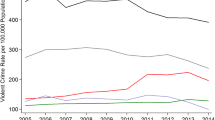Abstract
Human trafficking has been identified as a growing concern across the globe, however, little is known regarding the attitudes of criminal justice actors, notably prosecutors. To address this gap, prosecutors from Bosnia and Herzegovina were surveyed to gain an understanding of their experiences and attitudes related to sex trafficking. Findings suggest that over half of the prosecutors surveyed had worked with sex trafficking victims. Results also indicate a small portion of prosecutors held punitive attitudes for victims, but a significant majority held them for traffickers and customers. In addition to the presentation of findings related to training and knowledge held by prosecutors, limitations and implications are also discussed.
Similar content being viewed by others
Notes
More recent estimates for trafficking victims in BiH were searched for but none were discovered. In contrast, official figures disclosed by BiH along with various agencies and organizations have more recently focused on the number of identified victims within the country.
The country signed the protocol on December 12, 2000, which was subsequently ratified on April 24, 2002.
Minimum standards for the TVPA include: (1) prohibition and punishment for severe forms of trafficking, (2) punishment for sex trafficking offenses equitable to similarly severe sexual crimes, (3) punishment for trafficking in general should be severe enough so that it serves as a deterrent, and (4) continuing attention and efforts to reduce severe trafficking in persons (U.S. Department of State 2011).
The difference between tier 2 and tier 2 watch list is that the latter includes: (1) increasing or a significant number of victims of severe trafficking, (2) a lack of increased efforts to address severe trafficking from the previous year, and (3) the country has disclosed that significant efforts are being pursued to achieve compliance with the minimum standards (U.S. Department of State 2015).
A specific figure on the number of individuals approached and asked to complete the survey is not available to calculate the proportion of individuals who agreed to participate in the survey. What is known is that over 100 participants were present at the conference (Ministry of Security of B & H 2013) (although the total figure of individuals who attended [but who might not have registered nor participated] is unknown).
The original survey instrument was six pages long and included a total of 89 questions, with a number of items containing multiple questions contained within them. Original instrument questions not present in the reduced version included those related to: (1) investigation techniques for the crime of sex trafficking (e.g., forensic examinations), (2) if within the past year they had worked on cases involving trafficking women, traffickers, and customers, and (3) profiles of customers. In addition, the original survey contained three additional attitudes statements compared to the reduced survey.
While human trafficking does not require international movement, human smuggling by definition does require the movement between national border thresholds (U.S. Department of State 2006).
In order, the three trafficking figures cited by Farrell et al. (2008) represent training reported within a random survey of agencies (17.9 %), agencies located in areas with a medium to large population (38.5 %), and task force agencies (90.9 %).
References
ASTRA (2013) Situation analyzes of human trafficking Bosnia and Herzegovina, Croatia, FYR of Macedonia and Serbia. Available at: http://www.osce.org/odihr/106001?download=true. Accessed 13 Sept 2015
Batsyukova S (2007) Prostitution and human trafficking for sexual exploitation. Gender Issues 24(2):46–50
Clawson HJ, Dutch N, Cummings M (2006) Law enforcement response to human trafficking and the implications for victims: current practices and lessons learned. Available at: https://www.ncjrs.gov/pdffiles1/nij/grants/216547.pdf. Accessed 13 Sept 2015
Clawson HJ, Dutch N, Lopez S, Tiapula S (2008) Prosecuting human trafficking cases: lessons learned and promising practices. Available at: https://www.ncjrs.gov/pdffiles1/nij/grants/223972.pdf. Accessed 13 Sept 2015
Council of Europe (2013) Report concerning the implementation of the Council of Europe Convention on Action against Trafficking in Human Beings by Bosnia and Herzegovina. Available at: http://www.coe.int/t/dghl/monitoring/trafficking/Docs/Reports/GRETA_2013_7_FGR_BIH_with_cmnts_en.pdf. Accessed 13 Sept 2015
Council of Ministers of Bosnia and Herzegovina (2013) Strategy to counter trafficking in human beings in Bosnia and Herzegovina and action plan 2013–2015. Available at: http://msb.gov.ba/PDF/brosura%20eng%20final%20mail%20(1).pdf. Accessed 13 Sept 2015
Dawson A (2008) Post-war settlements and the production of new illegalities: the case of Dayton and people trafficking and prostitution in Bosnia and Herzegovina. Dialect Anthropol 32(1/2):123–137
Dewey S (2012) Rethinking survival sex and trafficking in conflict and post-conflict zones: the case of Bosnia-Herzegovina. Wagadu 10:15–31
Farrell A, McDevitt J, Fahy S (2008) Understanding and improving law enforcement responses to human trafficking: final report. Available at: https://www.ncjrs.gov/pdffiles1/nij/grants/222752.pdf. Accessed 13 Sept 2015
Farrell A, McDevitt J, Pfeffer R, Fahy S, Owens C, Dank M, Adams W (2012) Identifying challenges to improve the investigation and prosecution of state and local human trafficking. Available at: https://www.ncjrs.gov/pdffiles1/nij/grants/238795.pdf. Accessed 13 Sept 2015
Gallagher A, Holmes P (2008) Developing an effective criminal justice response to human trafficking. Int Crim Justice Rev 18(3):318–343
Haynes DF (2010) Lessons from Bosnia’s Arizona market: harm to women in a neolibralized postconflict reconstruction process. Univ Penn Law Rev 158(6):1779–1829
High Judicial and Prosecutorial Council of Bosnia and Herzegovina (2014) Individual reports on the work of the prosecutors in 2013. Available at: http://vsts.pravosudje.ba/vstv/faces/pdfservlet;jsessionid=02faa80bde004d5c143684099a14cd8b1f75677f718ee0e6794a5ab2d884c5eb.e34TbxyRbNiRb40LchiNbxyQchmOe0?p_id_doc=28706. Accessed 13 Sept 2015
International Organization for Migration (2001) Victims of trafficking in the Balkans: a study of trafficking in women and children for sexual exploitation to, through and from the Balkans. Available at: http://www.childtrafficking.com/Docs/iom_2001__victims_of_traffi.pdf. Accessed 13 Sept 2015
Jahic J, Finckenauer JO (2005) Representations and misrepresentations of human trafficking. Trends Organized Crime 8(3):24–49
Jennings KM, Nikolić-Ristanović V (2013) Political economics of peacekeeping, local gender relations and sex trafficking victimization: peacekeepers as patrons. Int Perspect Vict 7(2):36–45
Lalić V (2007) The emergence of trafficking in women and children in Bosnia and Herzegovina: a case study. In: Ebbe ONI, Das DK (eds) Global trafficking in women and children. CRC Press, Boca Raton
Maljevic A (2005) Trafficking in women in Bosnia and Herzegovina. In: van Duyne PC, von Lampe K, van Dijck M, Newell JL (eds) The organized crime economy: managing crime markets in Europe. Wolf Legal Publishers, Nijmegen
Ministry of Security of B & H (2013) News. Available at: http://www.bihat.ba/index.php?option=com_content&view=article&id=377:odrzano-vi-strucno-savjetovanje-tuzilaca-u-bosni-i-hercegovini&catid=103&Itemid=543. Accessed 13 Sept 2015
Muftić LR (2013) Attitudes regarding criminal justice responses to sex trafficking among law enforcement officers in Bosnia and Herzegovina. Varstvoslovje, J Crim Justice Secur 15(2):177–189
Muftić LR (2014) Securing the border in Bosnia and Herzegovina: an exploratory analysis of the impact of training on officers’ knowledge and experiences related to sex trafficking. Eur J Crim Pol Res 20(2):225–241
Murray J (2003) Who will police the peace-builders? the failure to establish accountability for the participation of United Nations civil police in the trafficking of women in post-conflict Bosnia and Herzegovina. Colum Hum Rts L Rev 34(2):475–527
Obradović V (2004) Trafficking in women in Bosnia and Herzegovina. The Embassy of the United States of America in BiH, Office of Public Affairs & Faculty of Criminology-Research Center Sarajevo, Sarajevo
Official Gazzette (2010) Criminal Code of Bosnia and Herzegovina, No. 03/03, 32/03, 34/03,54/04, 61/04, 30/05, 53/06, 55/06, 32/07, 08/10. Available at: http://www.tuzilastvobih.gov.ba/?opcija=sadrzaj&kat=4&id=40&jezik=e. Accessed 13 Sept 2015
Official Gazzette (2013a) Criminal Code of Republic of Srpska, No. 49/03, 108/04, 37/06, 70/06, 73/10, 1/12, 67/13. Available at: http://www.tuzilastvobih.gov.ba/files/docs/Krivicni_zakon_RS_izmjene_i_dopune_67_13_bos-hrv.pdf. Accessed 28 Oct 2015
Official Gazzette (2013b) Criminal Code of Brčko District, No. 10/03, 45/04, 06/05, 21/10, 52/11, 33/13. Available at: http://www.tuzilastvobih.gov.ba/files/docs/Krivicni_zakon_BD_BiH_precisceni_tekst_33_13_bos.pdf (accessed 28 October 28, 2015)
Organization for Security and Co-operation in Europe Mission to Bosnia and Herzegovina (2006) Plea Agreements in Bosnia and Herzegovina: practices before the Courts and their compliance with international human rights standards. Available at: http://www.oscebih.org/documents/osce_bih_doc_2010122311061412eng.pdf. Accessed 13 Sept 2015
Overbaugh E (2009) Human trafficking: the need for federal prosecution of accused traffickers. Seton Hall L Rev 39(2):635–664
Polaris Project (2014) Myths and misconceptions. Available at: http://www.polarisproject.org/human-trafficking/overview/myths-and-misconceptions. Accessed 13 Sept 2015
Public Institution Centre for Judicial and Prosecutorial Training of Federation BiH (2013) Professional counseling of prosecutors in Bosnia and Herzegovina. Available at: http://www.fbih.cest.gov.ba/index.php?option=comcontent&task=view&id=257&ItemId=2. Accessed 13 Sept 2015
Rathgeber C (2002) The victimization of women through human trafficking- an aftermath of war? Eur J Crime Crim L Crim Just 10(2/3):152–163
Schloenhardt A, Astill-Torchia P, Jolly JM (2012) Be careful what you pay for: awareness raising on trafficking in persons. Wash U Global Stud L Rev 11(2):415–435
Simon S (2008) Human trafficking and Florida law enforcement. Available at: http://www.fdle.state.fl.us/Content/getdoc/e77c75b7-e66b-40cd-ad6e-c7f21953b67a/Human-Trafficking.aspx. Accessed 13 Sept 2015
U.S. Department of State (2006) Fact sheet: distinctions between human smuggling and human trafficking. Available at: http://www.state.gov/documents/organization/90541.pdf. Accessed 13 Sept 2015)
U.S. Department of State (2011) Trafficking victims protection act: minimum standards for the elimination of trafficking in persons. Available at: http://www.state.gov/j/tip/rls/tiprpt/2011/164236.htm. Accessed 28 Oct 2015
U.S. Department of State (2015) Trafficking in persons report 2015, country narratives: Bosnia and Herzegovina. Available at: http://www.state.gov/documents/organization/245365.pdf. Accessed 28 Oct 2015
United Nations Development Programme (2009) Assessment of development results: Bosnia and Herzegovina. Available at: http://www.oecd.org/countries/bosniaandherzegovina/46817943.pdf. Accessed 13 Sept 2015
United Nations Office on Drugs and Crime (2000) Protocol to prevent, suppress and punish trafficking in persons, especially women and children, supplementing the United Nations convention against transnational organized crime. Available at: http://www.osce.org/odihr/19223?download=true. Accessed 13 Sept 2015
United Nations Office on Drugs and Crime (2009) International framework for action to implement the Trafficking in Persons Protocol. Available at: http://www.unodc.org/documents/human-trafficking/Framework_for_Action_TIP.pdf. Accessed 13 Sept 2015
United Nations Office on Drugs and Crime (2012) Global report on trafficking in persons. Available at: https://www.unodc.org/documents/data-and analysis/glotip/Trafficking_in_Persons_2012_web.pdf. Accessed 20 Feb 2016
Vandenberg ME (2002) Hopes betrayed: trafficking of women and girls to post-conflict Bosnia and Herzegovina for forced prostitution. Human Rights Watch, NY
Wilson DG, Walsh WF, Kleuber S (2006) Trafficking in human beings: training and services among US law enforcement agencies. Police Pract Res 7(2):149–160
Author information
Authors and Affiliations
Corresponding author
Ethics declarations
Conflict of Interest
The authors declare that they have no conflict of interest.
Rights and permissions
About this article
Cite this article
Grubb, J.A., Muftić, L.R. & Deljkić, I. An exploratory analysis of prosecutorial attitudes of sex trafficking in Bosnia and Herzegovina. Trends Organ Crim 19, 175–194 (2016). https://doi.org/10.1007/s12117-016-9267-2
Published:
Issue Date:
DOI: https://doi.org/10.1007/s12117-016-9267-2




